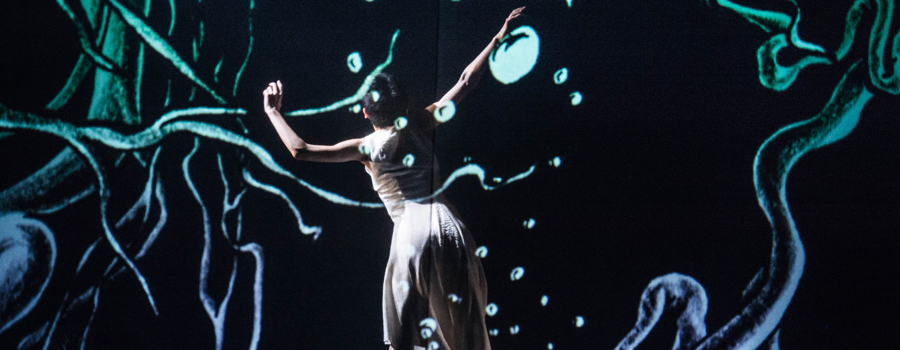
Tabaimo and Maki Morishita: Fruits borne out of rust
Friday, February 28, 2020 at 7:30pm
CFA Theater
$28 general public; $26 senior citizens, Wesleyan faculty/staff/alumni, non-Wesleyan students; $6 Wesleyan students, youth under 18
Saturday, February 29, 2020 at 2:00pm
CFA Theater
$28 general public; $26 senior citizens, Wesleyan faculty/staff/alumni, non-Wesleyan students; $6 Wesleyan students, youth under 18
Save with a Family Four Pack! Get four matinee tickets for only $35.
“Initially, [Tabaimo’s works] seem straightforward, but they quickly morph into something distinct and even peculiar and deliciously inexplicable.”
—Hyperallergic
Conceived and directed by Japanese visual artist Tabaimo in collaboration with choreographer Maki Morishita, the New England premiere of the whimsical, mischievous multimedia work Fruits borne out of rust (2016) features solo dancer Chiharu Mamiya and two on-stage musicians playing an original score by Yusuke Awazu and Keisuke Tanaka.
Tabaimo will be giving a free artist talk on Tuesday, February 25, 2020 at 4:30pm in the Seminar Room of the College of East Asian Studies at Mansfield Freeman Center, located at 343 Washington Terrace on the Wesleyan campus in Middletown.
Tabaimo’s intricate animations transform the stage into a wood floor apartment, a large birdcage that traps the dancer with a dove, and a line of tatami mats that swallows the dancer whole. Her collaborator, award-winning choreographer Maki Morishita, mischievously blends the subtle movements of the dancer's extremities with the dynamic drive of her limbs and torso, enhancing Tabaimo's peculiar and introspective world.
The work explores the notion of moving between states of stability and instability, suggesting an innate power to renew ourselves after our bodies and souls have suffered and been neglected. The title, "Fruits borne out of rust," is a play on words of the Japanese expression mi kara deta sabi, or "rust from the body (of a sword)." It refers to the blade of a sword that rusts due to the owner's negligence and lack of care, symbolizing a person whose failures are caused by his or her own sloppiness. However, Tabaimo views rust as an unseemly and energetic by-product of iron attempting to stabilize through oxidization. By flipping the words in the Japanese title Sabi kara deta mi, or “Fruits borne out of rust,” Tabaimo conveys the hope that something (mi, or fruits) may germinate from the unstable process of aging; that there is the potential for progress even though the body may feel rusty from neglect. The narrative of this performance revolves around the fluctuations between stability and instability—an endless loop suggesting room for growth, and eventually, the possibility of bearing fruit. In addition to being the director and video animator for "Fruits borne out of rust," Tabaimo also appears in the piece as the third musician on stage playing the xylophone synthesizer.
Fruits borne out of rust is supported by the Agency for Cultural Affairs, Government of Japan through the Japan Arts Council, and The Japan Foundation through the Performing Arts JAPAN program.

Special thanks to NEC Display Solutions, Ltd. Rehearsal space for this creation was provided by The Saison Foundation.
![]()
Image credit: Bozzo.